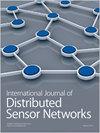认知无线电网络中的节能智能协同频谱感知算法
IF 2.5
4区 计算机科学
Q3 COMPUTER SCIENCE, INFORMATION SYSTEMS
International Journal of Distributed Sensor Networks
Pub Date : 2022-09-01
DOI:10.1177/15501329221125119
引用次数: 1
摘要
绿色通信是当前和未来无线通信的需求。认知无线电网络作为下一代通信网络,也需要满足绿色通信的要求。因此,提高能量效率是认知无线电网络发展的必然要求。然而,需要在提高能源效率的同时折衷传感性能。考虑到传感性能和能源效率这两个重要指标,本文提出了一种分组算法,该算法可以在提高频谱传感性能的同时有效地提高能源效率。该算法通过训练获得节点可靠性的初始值,并根据最高可靠性值对其进行排序,然后选择偶数个可靠性值最高的节点,并将所选节点分为两组,两组节点轮流进行交替工作。此时,未参与协同频谱感知的其他节点处于静默状态,等待融合中心的指令。实验结果表明,与传统算法相比,该算法在传感性能和能效两个指标上都有很大的提高。本文章由计算机程序翻译,如有差异,请以英文原文为准。
Energy-efficient and intelligent cooperative spectrum sensing algorithm in cognitive radio networks
Green communication is the demand of current and future wireless communication. As the next-generation communication network, cognitive radio network also needs to meet the requirements of green communication. Therefore, improving energy efficiency is an inevitable requirement for the development of cognitive radio networks. However, there is a need to compromise sensing performance while improving energy efficiency. To take into account the two important indicators of sensing performance and energy efficiency, a grouping algorithm is proposed in this article, which can effectively improve the energy efficiency while improving the spectrum sensing performance. The algorithm obtains the initial value of the reliability of the nodes through training, and sorts them according to the highest reliability value, then selects an even number of nodes with the highest reliability value, and divides the selected nodes into two groups, and the two groups of nodes take turns in Alternate work. At this time, other nodes not participating in cooperative spectrum sensing are in a silent state, waiting for the instruction of the fusion center. The experimental results show that compared with the traditional algorithm, the proposed algorithm has a great improvement in the two indicators of sensing performance and energy efficiency.
求助全文
通过发布文献求助,成功后即可免费获取论文全文。
去求助
来源期刊
CiteScore
6.50
自引率
4.30%
发文量
94
审稿时长
3.6 months
期刊介绍:
International Journal of Distributed Sensor Networks (IJDSN) is a JCR ranked, peer-reviewed, open access journal that focuses on applied research and applications of sensor networks. The goal of this journal is to provide a forum for the publication of important research contributions in developing high performance computing solutions to problems arising from the complexities of these sensor network systems. Articles highlight advances in uses of sensor network systems for solving computational tasks in manufacturing, engineering and environmental systems.

 求助内容:
求助内容: 应助结果提醒方式:
应助结果提醒方式:


